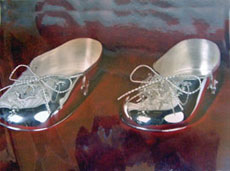|
VI. Background
Many of the conflicts between Europeans and immigrants have their origin in religious differences. But the dimension of the problems is not easily recognised; the "great concealment" is part of political correctness. The tensions between Jews and Christians have in our day transformed into tensions between Arabs and Jews, between the Christian world and the Muslim world, what some call "the clash of civilisations" (reference). In this process, the Muslims/Arabs are described as different, are identified with the complete other, with the almost absolute other.

Many immigrants who did not practise their religion in their own countries, become militant and practise their religion fervorously in the country that receives them. The return to religion in Europe has a great deal to do with today's need for points of reference, made stronger by the need to react to groups of other religious traditions. "If the adolescent cannot and does not want to go back to the traditionalism and unquestioned identity of his past world, he must, on penalty of utter disorientation, reconstruct, at the level of basic concepts, the normative orders that his hypothetical gaze has destroyed [...]. Using the rubble of devalued traditions, traditions that have been recognized to be merely conventional [...]", but, perhaps, not valid or worthy of recognition, according to the adolescent (reference).
Depositum fidei
The depositum fidei is constituted by the set of truths the faithful must give their complete assent to. "Theologians, respecting the methods and demands of the sacred science, are invited to search for more appropriate ways of communicating the doctrine to the men of their times; because the deposit of faith is one thing, that is, its truths, but quite another is the way to formulate them in such a way that they keep their sense and meaning" (reference).
The Churches, Synagogues and Mosques often consider as belonging to the depositum many things that are no more than the vehicle of the message in a specific time in history, and they take as universal and invariable norms of conduct what are really no more than customs and habits of the peoples, inherited from their ancestors. Christianity and Judaism justify their actions with biblical texts and tradition. Both believe in the Old Testament although they have many differences as to its interpretations; what is more, for Christianity the New Testament is also a fundamental text, whereas Judaism does not recognise it as such.
In many cases, Judaism, Christianity and Mahometism, the three historical religions, work with the coherence and logic of myth. Myth sustains the life and actions of man and society; thanks to myth, the individual finds his place in the world; it serves at once both as an explanation and as a norm, and links everything to the end or to the beginning. A myth is much like an invariable social charter; the system of values around which people organise themselves. Everything works by opposition; one of the terms, the one which is considered to be dangerous, must always be excluded. It is necessary to isolate the good in order to preserve it; difference and otherness are always excluded in favour of similarity. All analogies and similarities are brought out, all euphemistic processes are put into action in order to do away with anything that causes separation. Unity and identity are what is looked for.
Time, a source of differences, is conceived as something immobile. Today is confused with yesterday; tomorrow is confused with today, becoming no more than an infinite repetition of the past, of the "illo tempore". Time is linear and has no other worth than that of offering a chance to achieve perfection. Time passed with men is wasted time. It is difficult for the logic of opposition to assimilate the new (reference). When it comes to coexisting, the different groups and communities point out and stress all the things everyone has in common; they have no other choice because they live within one same economic and social system. This does not mean that tensions do not arise and conflicts do not break out, when each group searches for their own aims which clash with the interests of other groups.
In reality, what one culture says about things is not the truth of the things themselves but rather what that culture believes things are. What influences the behaviour of one people towards an other is what each of them "believe the other is, not the "genetic truth" which can be revealed by studies of the human genome. Metaphor is a cognitive procedure. To a great extent, human beings relate to the world metaphorically. Men relate with each other and establish themselves as individuals through metaphors. (reference). The contradictions, and therefore the tensions, are structural both on an individual level and a social level. The only thing that remains for the individual and society is to learn from them and try to avoid them. The pure and the criminal are two interchangeable poles of the same reality.

Every culture has a series of limits that it cannot cross without risk of self-destruction. Two cultures are two different worlds or two irreconcilable value systems. A world in which the different cultures aspire to no more than to celebrate each other, would lose the capacity of attraction that it may have had over the others and possibly even its very raison d'etre . As long as cultures consider themselves different from one another, they may voluntarily ignore each other or consider the other as a valid interlocutor for dialogue (reference).
Man lives here and now; and outside "this space" and "this time" it is impossible to think man. The return to tradition in Europe responds to no other need than that of searching for references. The return to religion is explained, to a great extent, by this need for references. Men are like plants: they need earth to settle their roots. Processions and devotions are recovered, even against hierarchy; in what have been called civil processions. Sometimes, man today reincorporates tradition to his life forgetting the historical and geographical context in which he was born and brought up. The search for identity becomes, for many groups, the fundamental source of social meaning and structuring of organisations.
|
